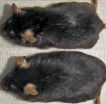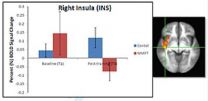(Press-News.org) Poor-quality sleep during the third trimester of pregnancy can increase the odds of weight gain and metabolic abnormalities in offspring once they reach adulthood, according to a new study published online May 8, 2014, in the journal Diabetes.
The researchers linked the excess weight and changes in metabolism to epigenetic modifications that reduce expression of the gene for adiponectin—a hormone that helps regulate several metabolic processes, including glucose regulation. Lower levels of adiponectin correlate with increased body fat and reduced activity.
"Disrupted sleep is a common problem during the final trimester of a pregnancy," said study director, sleep specialist David Gozal, MD, the Herbert T Abelson professor of pediatrics at the University of Chicago. "For some women, sleep fragmentation, especially sleep apnea, can be profound. We wanted to devise a system that enabled us to measure the potential impact of fragmented sleep on the fetus, which is uniquely susceptible so early in life."
To test this in humans could take 50 years, so Gozal's team devised experiments using pregnant mice. The researchers interrupted sleep for half of the mice during days 15 through 19 of pregnancy, the mouse equivalent of the third trimester. During the day, when mice normally sleep, a motorized brush swept through those cages every two minutes, forcing the mouse mothers-to-be to wake up briefly, step over the brush and go back to sleep. Pregnant mice in the other cages were not disturbed.
Newborns from both groups weighed the same at birth and initially had normal feeding habits and growth trajectories, but diverged in adulthood.
"For several weeks after weaning all the mice seemed fine," Gozal said. "But after 16 to 18 weeks — the mouse equivalent of early middle age — we noticed that the male mice born to moms with fragmented sleep were eating more. Their weights started creeping up."
The researchers focused on males because their hormone levels are less complex and easier to track. By 24 weeks the sons of sleep-disturbed mothers weighed about 10 percent more than the sons of mice with uninterrupted sleep.
"This is not huge obesity," Gozal said, "just 10 percent, a little extra at this stage. This would amount to 15 extra pounds in a human adult." A few of these mice, however, "became morbidly obese at 18 months of age or so," he said. "They died long before their unexposed counterparts."
Offspring from mothers with fragmented sleep revealed health problems in addition to weight gain. They scored poorly on glucose-tolerance tests. They produced normal amounts of insulin but it was less effective, failing to lower glucose levels as expected. Insulin resistance is a hallmark of metabolic syndrome and type 2 diabetes.
They also had disproportionately high amounts of visceral white adipose tissue, the "bad fat," as well as elevated levels of low-density lipoproteins, the bad cholesterol. Plus, their fat cells produced less adiponectin.
Adiponectin is usually a "beneficial hormone," Gozal said. "It can reduce cholesterol, make you more sensitive to insulin, protect your heart." As adiponectin levels in adults go up, body-fat percentage tends to go down. Expression of the adiponectin gene was reduced in the offspring of sleep-fragmented mothers, especially in their visceral fat cells.
A closer look revealed epigenetic changes, such as methylation and histone modification, which shut down selected genes, often in response to environmental stresses.
"We found that the offspring of sleep-deprived mothers had largely inactivated AdipoQ, the adiponectin gene," Gozal said. "Such changes may affect other genes as well; we haven't studied all the potential targets yet. Even so, this is the first example of a perturbation during pregnancy that translates into a genetic risk, in midlife, for the next generation."
"This is kind of scary," he added. "Will this generation, the sons of sleep-deprived mice, who are already at increased risk for metabolic syndrome and type 2 diabetes, transmit this inherited risk, perhaps compounded by new stresses, to their offspring?"
INFORMATION:
Additional authors include Abdelnaby Kahlyfa, Vesco Mutskov, Alba Carreras, Ahamed Khalyfa and Fahed Hakim, all from the University of Chicago Medicine.
Mothers' sleep, late in pregnancy, affects offspring's weight gain as adults
Mouse study ties disrupted sleep to lasting genetic changes
2014-05-16
ELSE PRESS RELEASES FROM THIS DATE:
Water pipe smoking causes significant exposure to nicotine and cancer-causing agents
2014-05-16
PHILADELPHIA — Young adults who smoked water pipes in hookah bars had elevated levels of nicotine, cotinine, tobacco-related cancer-causing agents, and volatile organic compounds (VOC) in their urine, and this may increase their risk for cancer and other chronic diseases, according to a study published in Cancer Epidemiology, Biomarkers & Prevention, a journal of the American Association for Cancer Research.
"This study reports systemic intake of tobacco-specific nitrosamines and VOCs after a typical water pipe-smoking session in a hookah bar setting, thus making the ...
War and peace (of mind)
2014-05-16
Researchers from the University of California, San Diego School of Medicine and Naval Health Research Center have found that mindfulness training – a combination of meditation and body awareness exercises – can help U.S. Marine Corps personnel prepare for and recover from stressful combat situations.
The study, published in the May 16, 2014 online issue of the American Journal of Psychiatry, suggests that incorporating meditative practices into pre-deployment training might be a way to help the U.S. military reduce rising rates of stress-related health conditions, including ...
Male infertility linked to mortality in study led by Stanford researcher
2014-05-16
STANFORD, Calif. — Men who are infertile because of defects in their semen appear to be at increased risk of dying sooner than men with normal semen, according to a study led by a researcher at the Stanford University School of Medicine.
Men with two or more abnormalities in their semen were more than twice as likely to die over a roughly eight-year period as men who had normal semen, the study found.
Smoking and diabetes — either of which doubles mortality risk — both get a lot of attention, noted the study's lead author, Michael Eisenberg, MD, PhD, assistant professor ...
Magnets and kids: A dangerous duo
2014-05-16
Cincinnati, OH, May 16, 2014 -- Magnet ingestions by children have received increasing attention over the past 10 years. With the growing availability of new and stronger neodymium-iron-boron magnets being sold as "toys," there has been an increase of cases of ingestion, resulting in serious injury and, in some cases, death. In a new study scheduled for publication in The Journal of Pediatrics, researchers studied the trends of magnetic ingestions at The Hospital for Sick Children (SickKids), Canada's largest children's hospital.
Matt Strickland, MD, and colleagues ...
Study reveals 1 in 10 16-year-olds surveyed have considered self-harm
2014-05-16
One in ten 16-year-olds surveyed in a new study by Queen's University and the University of Ulster have considered self-harm or taking an overdose.
The results of the annual Young Life and Times (YLT) survey, which are published today (Friday 16 May) during Mental Health Awareness Week, also found that almost a third of 16-year-olds questioned had experienced serious personal, emotional or mental health problems at some point in the past year.
1,367 16-year-olds across Northern Ireland took part in the 2013 survey undertaken by ARK, a joint initiative by Queen's University ...
Living conditions in Iraq must improve if investment in health system is to yield results
2014-05-16
Despite enormous investment in Iraq's health system in the 10 years since the US-led invasion, the health condition of Iraqis has deteriorated and will fail to improve unless more is done to improve living conditions. A review published today in the Journal of the Royal Society of Medicine concludes that continual investment in health services is crucial to elevate the health status of the Iraqi population, but that progress will be limited without improvements in housing, water and sanitation, electricity, transport, agriculture, education and employment.
The study was ...
Interrupted breathing during sleep affects brain neurons necessary to regulate heart rate
2014-05-16
Interrupted breathing during sleep affects brain neurons necessary to regulate heart rate
Sufferers of a common sleep-breathing disorder have diminished activity among neurons responsible for keeping heart rate low, reveals a new study published today [16 May] in The Journal of Physiology.
The research discovered that in obstructive sleep apnoea (OSA), neurons in the brainstem that control heart rate experience a blunting of their activity. The reduction of neuronal activity likely contributes to the increased heart rate, blood pressure and risk of adverse cardiovascular ...
Two large meals (breakfast and lunch) better than 6 small meals with same calories for controlling weight and blood sugar in people with type 2 diabetes
2014-05-16
Research published in Diabetologia (the journal of the European Association for the Study of Diabetes) suggests that two large meals (breakfast and lunch), rather than six small meals with the same total calories, are better for controlling weight and blood sugar in people with type 2 diabetes. The research is by Dr Hana Kahleová, Diabetes Centre, Institute for Clinical and Experimental Medicine, Prague, Czech Republic, and colleagues.
The study assessed 54 patients (29 men, 25 women) treated with oral diabetes drugs, aged 30–70 years, BMI 27–50 kg/m2 and HbA1c of 6–11.8% ...
Complex interactions may matter most for longevity
2014-05-16
PROVIDENCE, R.I. [Brown University] — If studying a single gene or a diet that might extend longevity is like searching for a fountain of youth, then a new study calls for looking at something more like the whole watershed. Brown University biologists who experimentally throttled three such factors in fruit flies found that lifespan depended more on interactions among the factors than on the factors themselves.
"I think the main lesson is that these interaction effects are as significant or important as the [single] effects, such as diet effects alone or genetic effect ...
How some trypanosomes cause sleeping sickness while others don't
2014-05-16
Trypanosome parasites transmitted by tsetse flies cause devastating diseases in humans and livestock. Different subspecies infect different hosts: Trypanosoma brucei brucei infects cattle but is non-infectious to humans, whereas T. b. gambiense and T. b. rhodesiense cause sleeping sickness in humans. A study published on May 15th in PLOS Pathogens reveals how humans can fight off some trypanosomes but not others.
Sam Alsford, from the London School of Hygiene and Tropical Medicine, UK, and colleagues, undertook a comprehensive search for genes that make T. b. brucei ...
LAST 30 PRESS RELEASES:
Duke-NUS scientists identify more effective way to detect poultry viruses in live markets
Low-intensity treadmill exercise preconditioning mitigates post-stroke injury in mouse models
How moss helped solve a grave-robbing mystery
How much sleep do teens get? Six-seven hours.
Patients regain weight rapidly after stopping weight loss drugs – but still keep off a quarter of weight lost
GLP-1 diabetes drugs linked to reduced risk of addiction and substance-related death
Councils face industry legal threats for campaigns warning against wood burning stoves
GLP-1 medications get at the heart of addiction: study
Global trauma study highlights shared learning as interest in whole blood resurges
Almost a third of Gen Z men agree a wife should obey her husband
Trapping light on thermal photodetectors shatters speed records
New review highlights the future of tubular solid oxide fuel cells for clean energy systems
Pig farm ammonia pollution may indirectly accelerate climate warming, new study finds
Modified biochar helps compost retain nitrogen and build richer soil organic matter
First gene regulation clinical trials for epilepsy show promising results
Life-changing drug identified for children with rare epilepsy
Husker researchers collaborate to explore fear of spiders
Mayo Clinic researchers discover hidden brain map that may improve epilepsy care
NYCST announces Round 2 Awards for space technology projects
How the Dobbs decision and abortion restrictions changed where medical students apply to residency programs
Microwave frying can help lower oil content for healthier French fries
In MS, wearable sensors may help identify people at risk of worsening disability
Study: Football associated with nearly one in five brain injuries in youth sports
Machine-learning immune-system analysis study may hold clues to personalized medicine
A promising potential therapeutic strategy for Rett syndrome
How time changes impact public sentiment in the U.S.
Analysis of charred food in pot reveals that prehistoric Europeans had surprisingly complex cuisines
As a whole, LGB+ workers in the NHS do not experience pay gaps compared to their heterosexual colleagues
How cocaine rewires the brain to drive relapse
Mosquito monitoring through sound - implications for AI species recognition
[Press-News.org] Mothers' sleep, late in pregnancy, affects offspring's weight gain as adultsMouse study ties disrupted sleep to lasting genetic changes


